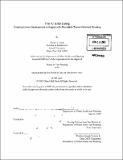The "L" is for living : creating urban development linkages with affordable transit-oriented housing
Author(s)
Davis, Omari Akil
DownloadFull printable version (42.21Mb)
Alternative title
Creating urban development linkages with affordable transit-oriented housing
Other Contributors
Massachusetts Institute of Technology. Dept. of Urban Studies and Planning.
Advisor
Sam Bass Warner, Jr.
Terms of use
Metadata
Show full item recordAbstract
What is a city? Who is the city for? A citizen's answer to these questions is closely connected with her or his sense of political power or representation in the city. Harvey Molotch argues that politically influential land-owning elites conceive of the city as a growth machine to increase their wealth and/or influence. The growth machine idea is often linked with the concept of the city as a place of pleasure. These two concepts invariably produce growth strategies-strategies that that do not reflect or include other concepts of the city, such as the city being a place of work or provider of services (Frug, Ford and Barron 2006). This scenario envisions two camps on either side of any publicly funded proposal, one composed of political proponents or growth machine-elites and the other composed of activist opponents. The City of Chicago finds itself in this position as it campaigns for the opportunity to host the 2016 Summer Olympic Games. The city is currently fighting on two fronts. One fight is global, against the other would-be host cities Rio, Rome, and Tokyo. The other fight is local against residents, who would rather have new schools than a new Olympic stadium. The likelihood of successful Games is greater if the two local sides can establish consensus. This thesis proposes a method of building consensus, by ideologically aligning with the "growth machine" and further by placing itself between the two poles of the city of work and services and the city of pleasure. (cont.) Operating in this framework this thesis posits that the city should host the Games, under the condition that there are beneficial linkages between the development for the Olympic Games and the residents. Moreover, this thesis posits that affordable housing in conjunction with transit-oriented development (TOD) is the best tool for linking the Games to benefits for the residents.
Description
Thesis (M.C.P.)--Massachusetts Institute of Technology, Dept. of Urban Studies and Planning, 2009. Includes bibliographical references (p. 108-113).
Date issued
2009Department
Massachusetts Institute of Technology. Department of Urban Studies and PlanningPublisher
Massachusetts Institute of Technology
Keywords
Urban Studies and Planning.